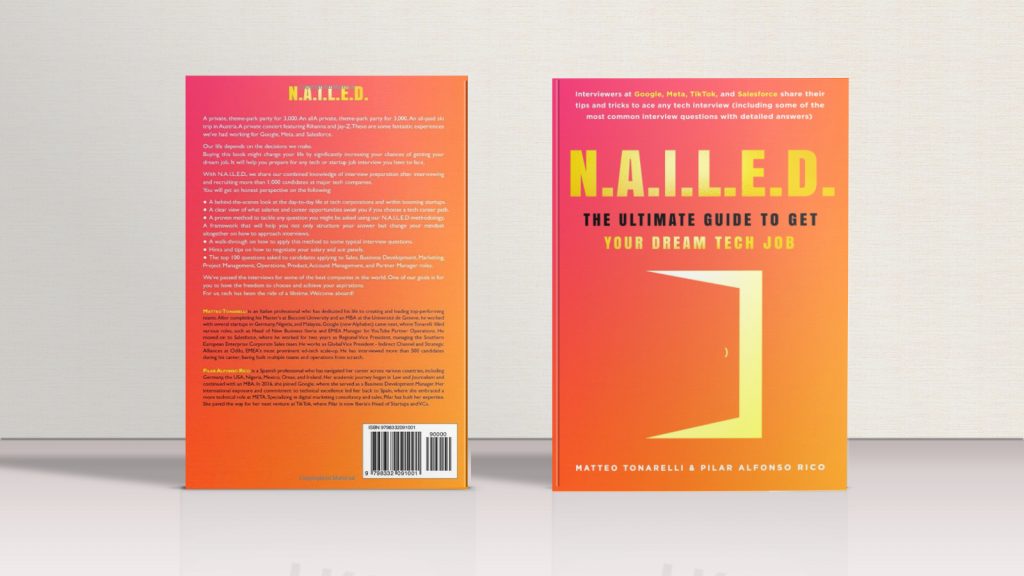Menu
Main Menu
Getting hired today isn’t about luck, it’s about strategy, visibility, and timing.
The tech industry moves fast, and hiring has evolved just as quickly. Recruiters rely on AI-powered systems, hiring managers look for a mix of hard and soft skills, and career transitions are becoming the norm.
This guide is your complete roadmap to getting hired in tech: from building the right skills to mastering interviews, using AI tools, and negotiating offers.
Whether you’re entering the industry for the first time or changing careers, you’ll find practical frameworks, examples, and internal links to deeper guides on each topic — all designed to help you learn, prepare, and get hired.
The job market has changed dramatically. What worked five years ago — generic resumes, one-size-fits-all applications, and motivational advice — no longer cuts it.
Modern hiring runs on algorithms, data, and differentiation:
Traditional advice tells you to “apply everywhere”. But real success now comes from strategic positioning — knowing your niche, optimizing your profile, and communicating your value clearly.
👉 That’s where Gogotechy comes in: we help you adapt to this new era with personalized preparation, AI-powered tools, and 1:1 career coaching built for modern hiring systems.
Let’s break this down: getting hired in tech today isn’t just about knowing how to code or having a polished LinkedIn profile. It requires three key pillars — technical skills, soft skills, and strategic preparation.
In tech, your hard skills are your entry ticket. Recruiters expect clear proof that you can perform in the role, whether you’re applying for software engineering, digital marketing, product management, or data analytics.
Start with the fundamentals: programming languages like Python, data visualization with Tableau or Power BI, or workflow tools like SQL. But technical ability isn’t limited to coding — roles in Sales, Customer Success, or Operations also require analytical thinking, product knowledge, and business acumen.
The best part? Many of these roles are learnable. Upskilling through tech bootcamps, specialized online courses, or even AI-powered job training tools can get you ready in months, not years.
Soft skills are now your competitive edge. The best candidates combine skill with empathy, curiosity, and adaptability — traits that make them thrive in collaborative, remote-first teams.
In today’s interviews, behavioral questions such as “Tell me about a time you failed” or “How do you deal with stress?” are designed to assess emotional intelligence and cultural fit. Employers want to know if you can handle ambiguity, give feedback constructively, and recover from setbacks — not just whether you can write good code.
Recruiters often say: “We hire for attitude, and train for skill.” Developing soft skills means strengthening your self-awareness, leadership, and communication style. It’s what allows you to answer confidently when you face the classic “Why should we hire you?” interview question.
That’s why at Gogotechy, we coach you to develop the mindset that turns preparation into confidence.
Even the most skilled professionals can struggle without a clear plan. A solid career strategy helps you align your goals, skills, and visibility — ensuring every step you take gets you closer to the right opportunity.
This includes:
Developing a strategic approach also means learning how to negotiate an offer, manage your online presence, and leverage your network to uncover hidden opportunities.
Think of this as your career roadmap — one that evolves as you grow.
Each of these pillars — technical mastery, soft skill development, and strategic preparation — is part of the Gogotechy learning system. Our programs combine AI coaching, mock interview practice, and expert-led career mentoring to help you connect these dots and transform learning into job offers.
The interview is no longer a test — it’s a performance of clarity, structure, and authenticity. Tech recruiters don’t just assess what you know, but how you think, communicate, and solve problems. Your job is to make it easy for them to say “yes.”
Your resume is a keyword map for algorithms and a narrative for humans. Learn how to:
👉 Go deeper: What Do Recruiters Look for in a Resume? Key Elements You Must Include → link here
Behavioral interviews are storytelling with evidence. The STAR method—Situation, Task, Action, Result—keeps you concise and credible.
When you use STAR effectively, you turn vague experiences into powerful, metric-driven stories.
Pro tip: Prepare STAR “tiles”—short, reusable stories tagged by skill (leadership, stakeholder management, problem solving, ownership). You’ll plug them into behavioral questions, cultural fit questions, and even the classic “Why should we hire you?”.
Behavioral questions reveal your judgment and collaboration style. Prepare with:
“Tell me about a time you failed.” → ownership, resilience.
“How do you deal with stress?” → self-regulation, prioritization.
“Describe a conflict with a teammate.” → collaboration, empathy.
“Walk me through a project you’re proud of.” → product thinking, impact.
“Why should we hire you?” → relevance to their business case, not your biography.
👉 Also see: Top 10 Essential Interview Questions and Answers to Land Your Next Job → link here
One of the most underestimated parts of an interview is the moment when the recruiter turns the spotlight and asks, “Do you have any questions for us?”
How you use that moment says more about you than any rehearsed answer.
Smart candidates ask smart questions — it signals curiosity, culture fit, and confidence.
Reps beat nerves. Practicing with AI tools or human coaches builds fluency and confidence. Record, review, and iterate — the same feedback loop used by top performers.
Many talented candidates walk out of interviews thinking they did well — and then never hear back. The problem often isn’t their skills, but how they communicate them.
Before a recruiter ever speaks to you, they’ve already Googled you.
Your personal brand is the sum of everything they find — your CV, LinkedIn profile, digital footprint, and how you show up online. In the tech world, this first digital impression often determines whether you’re shortlisted for an interview or lost in the noise.
A strong personal brand doesn’t mean self-promotion for its own sake; it means creating consistency between who you are, what you know, and the problems you can solve. It’s your professional signal in an ocean of noise.
Building your personal brand isn’t a one-off task; it’s a continuous conversation between your growth, your visibility, and the market’s needs. And at Gogotechy, we teach you how to speak that language fluently.
A successful CV highlights measurable results and relevant achievements. Focus on clarity, not decoration. Think of your CV as a narrative artifact that bridges human storytelling with machine readability.
Your LinkedIn is your public CV. Most recruiters don’t post jobs; they source directly through keyword searches and network referrals. Optimize your headline for search, write a compelling “About” section, and post content that reflects your expertise.
Networking is a skill, not luck. In tech, where many jobs are never publicly advertised, your network is the bridge between preparation and opportunity.
Start by showing up where conversations happen: niche Slack groups, product or UX communities, local meet-ups, and professional forums. Comment meaningfully, share what you’re learning, and be generous with advice.
The key mindset: give before you ask: people remember helpful contributors far more than cold messages.
In many tech companies, referred candidates are twice as likely to be interviewed and hired.
To earn referrals:
The tech industry is a constellation of roles that blend strategy, creativity, data, and execution. You don’t need to be a developer to work in tech. Every product needs marketers, sales professionals, analysts, and operations experts who understand how technology creates value.
Breaking into tech isn’t about starting from zero; it’s about translating what you already know into the language of the industry. Whether you come from consulting, education, finance, or design, there’s a path — if you know how to frame it.
Roles in Sales, Product, and Operations sit at the intersection of customers and technology. They reward people who can connect business goals with execution.
If you’ve worked in account management, B2B sales, or project coordination, you already have a foundation: communication, negotiation, process ownership — that tech companies value deeply.
If you’ve worked in consulting or finance, your analytical rigor and structured thinking are assets, especially for case interviews or business case studies used by startups and scale-ups.
Learning how to present your ideas through clear frameworks (like the McKinsey presentation framework) and how to prepare for case study interviews can help you stand out.
These roles demand a mix of business fluency and curiosity about technology, the ability to move between spreadsheets and storytelling, between KPIs and customer impact.
It’s about using experimentation and metrics to drive growth. You’ll need to be fluent in data, understanding attribution, customer journeys, and how to test hypotheses quickly. If you can connect metrics (CTR, CPA, ROAS) with strategic thinking, you’ll stand out even without years of agency experience.
Roles in product analytics, data science, and business intelligence require not only technical tools (SQL, Python, visualization dashboards) but also the ability to interpret and communicate insights to non-technical teams.
👉 What Tech Job Is Right for Me? A Step-by-Step Guide to Finding Your Career Path – this guide will help you identify which tech career paths match your strengths and how to start building the right capabilities today.
Making a career change into tech doesn’t mean starting over, it means repositioning your experience. The fastest-growing tech teams are hiring for adaptability, learning speed, and cross-functional empathy.
With the right strategy and targeted preparation, transitioning to tech is less about reinvention and more about translation.
Every company has unique rounds, but all look for curiosity, impact, and structured communication. Understanding the hiring process at these companies helps you tailor your prep, from STAR responses to cultural fit questions.
Recruiters are your allies. Understand what they prioritize — clarity, confidence, and cultural alignment.
At Gogotechy, our career coaches come from top tech companies like Google, Meta, or TikTok. They’ve led interviews, built teams, and sat in hiring committees.
They’ve been on both sides of the hiring table, so they know how recruiters think, what hiring managers prioritize, and how to stand out in interviews for top tech companies. We help you think, act, and perform like the candidates who make it through at the world’s most competitive companies.
Negotiation is the first step of your next chapter. How you negotiate says a lot about how you’ll advocate for yourself, collaborate with others, and make business decisions. In the world of tech, where compensation often includes salary, stock options, and bonuses, learning this skill is part of being a professional.
Here’s how to do it like a pro:
Remember: negotiation isn’t confrontation; it’s collaboration. You and the recruiter share a goal — finding an agreement where both sides feel valued.
AI isn’t replacing candidates, it’s empowering them. Smart job seekers are already using generative tools to optimize resumes, practice interviews, and automatically match with relevant roles.
At Gogotechy, we teach you to use AI strategically.
👉 Go deeper with our article on How to Use AI for an Interview: Tools, Tips & Best Practices.
Simulate interviews with AI-powered agents that adapt to your tone, analyze your answers, and give targeted feedback. Combine tools like InterviewBuddy to practice both technical and behavioral questions before the real thing. Also, use our AI agent #Gethired to prepare before your real interview.
Every candidate faces rejection. The difference between those who stop and those who get hired is resilience: the ability to learn, adapt, and keep showing up.
The modern tech job search is full of uncertainty: hiring freezes, automated rejections, long silence after final rounds. But confidence is a skill and it can be trained.
The trick is to replace doubt with data. Reflect on your achievements, gather feedback, and focus on progress, not perfection. If you’re ready to strengthen your confidence step by step, don’t miss our guide: How to Build Confidence in Job Interviews: 10 Proven Tips to Boost Your Career.
Everything in this guide connects here — into a single framework built to make you unstoppable.
At Gogotechy, we designed a system that transforms career preparation from chaos into clarity. Our approach merges behavioral psychology, AI-driven learning, and recruiter insight from people who’ve actually hired at top companies.
How? With our proprietary framework:
It’s not theory; it’s a repeatable process built for the way tech hiring actually works today.
Through our AI-powered search job strategies, live bootcamps and career acceleration programs, you’ll learn how to:
It’s a complete ecosystem designed to help you learn, prepare, and get hired faster.
👉 Explore Gogotechy’s tailored programs or reach out to our team to find the best path for your goals — and start building the career you’ve always wanted.
I’m Pilar Alfonso Rico, founder of Gogotechy. I have built my career at Google, Meta and TikTok as Head of Startups Iberia. After interviewing over 300 candidates, I’ve helped hundreds of professionals land roles across the tech and business ecosystem.
I built Gogotechy to give people the kind of career support I wish I had when I started out :practical, human, and built on real experience.
I’m also part of Calafia, an Adjunct Professor at IE, and collaborate with IESE, ISDI, Nova, and Zrive, helping students and professionals navigate their next career move and make an impact in the tech world.

Today, we lead a global network of 50+ certified mentors from top tech companies, helping students, career shifters, and professionals navigate the path into tech.

Discover the complete framework behind our proven job-search methodology. Whether you’re preparing for your first interview or your next big career move, the NAILED book gives you clear, actionable strategies to stand out and succeed.











| Cookie | Duration | Description |
|---|---|---|
| cookielawinfo-checkbox-analytics | 11 months | This cookie is set by GDPR Cookie Consent plugin. The cookie is used to store the user consent for the cookies in the category "Analytics". |
| cookielawinfo-checkbox-functional | 11 months | The cookie is set by GDPR cookie consent to record the user consent for the cookies in the category "Functional". |
| cookielawinfo-checkbox-necessary | 11 months | This cookie is set by GDPR Cookie Consent plugin. The cookies is used to store the user consent for the cookies in the category "Necessary". |
| cookielawinfo-checkbox-others | 11 months | This cookie is set by GDPR Cookie Consent plugin. The cookie is used to store the user consent for the cookies in the category "Other. |
| cookielawinfo-checkbox-performance | 11 months | This cookie is set by GDPR Cookie Consent plugin. The cookie is used to store the user consent for the cookies in the category "Performance". |
| viewed_cookie_policy | 11 months | The cookie is set by the GDPR Cookie Consent plugin and is used to store whether or not user has consented to the use of cookies. It does not store any personal data. |